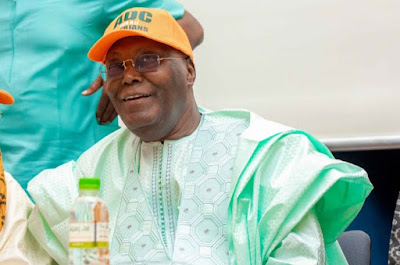 |
| Atiku Abubakar |
When news broke that Atiku Abubakar had formally left the PDP on July 14, 2025, many saw it as a fresh break. His letter to his ward chairman in Adamawa said he felt “irreconcilable differences” with the party’s direction .
On Channels TV’s Politics Today, former Women Affairs Minister Josephine Anenih said that report missed the real point. She argued Atiku actually left the PDP right after he lost in 2023 .
Anenih said Atiku drifted from PDP ideals the moment voters chose another candidate. She claimed he stopped acting as a member soon after the votes were tallied in February 2023 .
His camp counters that he stayed involved until mid-2025. They point to continuous party meetings he attended in Abuja and Lagos in late 2023 and early 2024 .
Still, Anenih’s words tap into wider doubts about Atiku’s loyalty to the PDP. He first left the party in 2014 to help found the APC. He then returned in late 2017. Now he’s set to run under the ADC banner for 2027 .
That back-and-forth fuels the idea he never fully re-embraced PDP goals after 2023. Anenih said he skipped key strategy sessions and fund drives right after the vote .
Yet PDP leaders insist he stayed. South-South caretaker chairman Emma Ogidi said the party kept ties strong with all past leaders, including Atiku, until his formal letter arrived this month .
Experts note this split story affects trust. Party insiders say clear dates matter for donor confidence and voter trust. If a big name quietly pulls back right after a loss, that sends a different message than a formal exit two years later.
Political analyst Dr. Amina Yahaya says clear records help voters hold leaders to account. She adds that a silent fade-away hurts party unity more than a clear break .
Meanwhile, Atiku’s own media office confirms his formal July 14 letter. They show a scanned copy addressed to Jada Ward 1’s chairman in Adamawa State .
In that letter, he said the PDP had strayed from its core values. He spoke of “irreconcilable differences” and a need to “pursue a path true to my vision” .
His office also notes he stayed active as PDP national chairman’s adviser until mid-2025. They cite minutes from a June 2024 steering meeting he chaired .
Bringing balance, Anenih’s view challenges that narrative. She urged the party to face internal gaps in loyalty and transparency.
Voters see this debate unfold as Atiku prepares for 2027 under ADC, alongside Peter Obi. They aim to unite opposition votes against the APC .
Atiku’s roots run deep. He joined PDP at its founding in 1998. He’s run for president four times, served as vice-president from 1999 to 2007, and built a vast network that spans party lines .
That history makes this spat over exact exit timing more than trivia. It speaks to how politicians claim—and keep—loyalty.
Josephine Anenih, a key PDP woman leader in the 2000s, sees it as a trust test. She warns that unclear moves drive donors away and weaken grass-roots ties .
In contrast, PDP South-South boss Emma Ogidi says members trust leaders who show up to meetings and face issues head-on . He urges all sides to focus on 2027 unity.
Atiku himself has stayed low on this claim. He’s focused on building the ADC’s platform and meeting stakeholders in Bauchi and Port Harcourt this July .
Experts say this standoff over dates will shape voter memory. People either see Atiku as someone who quietly checked out in 2023. Or they see him as someone who fought on until mid-2025 before making a clear break.
In a democracy, details matter. When big names shift lanes, voters note whether they did it openly or on the sly.
Right now, the PDP faces the same reckoning. It must ask how it tracks member engagement. How it records attendances and loyalty. How it flags those who really left at first setback.
Whatever the true date, both sides agree on one point. Atiku’s next fight is in 2027 under a new party. And that run will depend on how voters read the story of why, and when, he really left the PDP.
